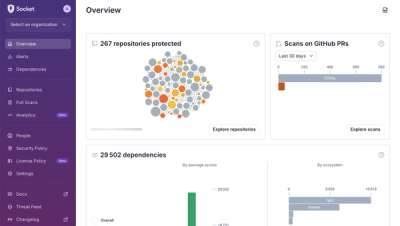
Product
A New Overview in our Dashboard
We redesigned Socket's first logged-in page to display rich and insightful visualizations about your repositories protected against supply chain threats.
@powersync/react-native
Advanced tools
PowerSync React Native SDK. Sync Postgres, MongoDB or MySQL with SQLite in your React Native app
PowerSync is a sync engine for building local-first apps with instantly-responsive UI/UX and simplified state transfer. Syncs between SQLite on the client-side and Postgres, MongoDB or MySQL on the server-side.
This package (packages/react-native) is the PowerSync SDK for React Native clients. It is an extension of packages/common.
See a summary of features here.
npx expo install @powersync/react-native
By default, this SDK requires @journeyapps/react-native-quick-sqlite as a peer dependency. Alternatively, you can install OP-SQLite from the PowerSync OP-SQLite package (currently in alpha).
Install it in your app with:
npx expo install @journeyapps/react-native-quick-sqlite
Watched queries can be used with either a callback response or Async Iterator response.
Watched queries using the Async Iterator response format require support for Async Iterators.
Expo apps currently require polyfill and Babel plugins in order to use this functionality.
npx expo install @azure/core-asynciterator-polyfill
Make sure to import the polyfill early in your application
// App.js
import '@azure/core-asynciterator-polyfill';
Install the async generator Babel plugin
pnpm add -D @babel/plugin-transform-async-generator-functions
Add the Babel plugin to your babel.config.js file
module.exports = function (api) {
return {
presets: [...],
plugins: [
// ... Other plugins
'@babel/plugin-transform-async-generator-functions'
]
};
};
If you are using this library in an Expo project and encounter issues with multiple versions of SQLite3, the conflict might be due to expo-updates also depending on SQLite. To resolve this, you can configure Expo to use the third-party SQLite pod.
Update your ios/Podfile.properties.json to include the following configuration:
{
"expo.updates.useThirdPartySQLitePod": "true"
}
When using a bare React Native app without a framework like Expo, the @powersync/react-native package does not work well with inline requires.
If you see the following error message
Super expression must either be null or a function
then you will need to add this to your metro.config.js:
const config = {
transformer: {
getTransformOptions: async () => ({
transform: {
inlineRequires: {
blockList: {
[require.resolve('@powersync/react-native')]: true
}
}
}
})
}
};
This package uses native libraries. Create native Android and iOS projects (if not created already) by running:
npx expo run:android
# OR
npx expo run:ios
Our SDK reference contains everything you need to know to get started implementing PowerSync in your project.
A changelog for this SDK is available here.
The full API reference for this SDK can be found here.
For example projects built with PowerSync and React Native, see our Demo Apps / Example Projects gallery. Most of these projects can also be found in the demos/ directory.
FAQs
PowerSync React Native SDK. Sync Postgres, MongoDB or MySQL with SQLite in your React Native app
We found that @powersync/react-native demonstrated a healthy version release cadence and project activity because the last version was released less than a year ago. It has 2 open source maintainers collaborating on the project.
Did you know?

Socket for GitHub automatically highlights issues in each pull request and monitors the health of all your open source dependencies. Discover the contents of your packages and block harmful activity before you install or update your dependencies.

Product
We redesigned Socket's first logged-in page to display rich and insightful visualizations about your repositories protected against supply chain threats.

Product
Automatically fix and test dependency updates with socket fix—a new CLI tool that turns CVE alerts into safe, automated upgrades.

Security News
CISA denies CVE funding issues amid backlash over a new CVE foundation formed by board members, raising concerns about transparency and program governance.